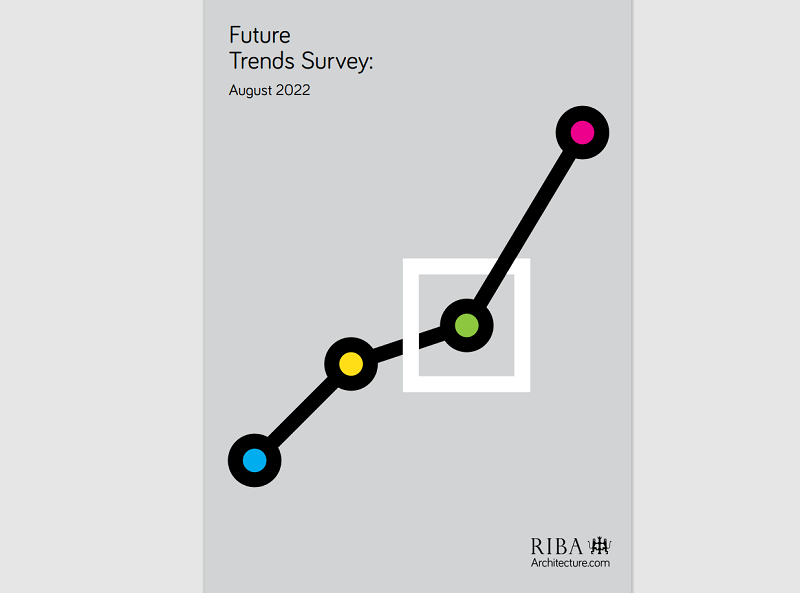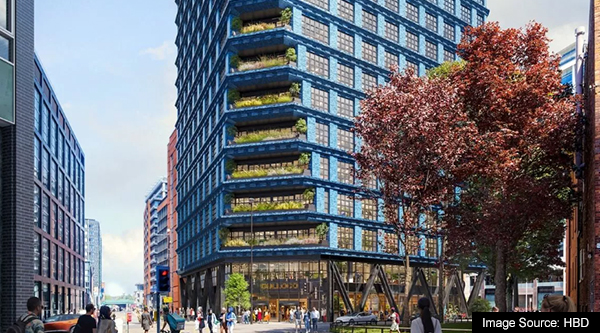The Royal Institute of British Architects (RIBA) has published the latest Future Trends survey results, a monthly report of the business and employment trends affecting the architects’ profession.
In August, the RIBA Future Trends Workload Index fell by 12 points to a balance figure of –8. In the next three months, 17% of practices said they expect workloads to increase, 25% expect them to decrease and 58% expect them to remain the same.
Three of the four work sectors have seen confidence fall, and all sectors are now in negative territory. Whilst the private housing sector has been the most buoyant since the pandemic began, reaching a record high of +42 in 2021, this month the sector posted a figure of –9. The commercial sector posted a balance figure of -2, down from +1 in July, and the public sector posted a score of -9, down from -6. Whilst there’s been a slight uptick for the community sector, it also remains in negative territory, posting a balance of -6, up from -10.

Levels of confidence continue to differ by practice size. Small practices (1 - 10 staff) recorded their most pessimistic balance score since June 2020: -12 compared to +1 in July. While large and medium-sized practices (11+ staff) remain positive about future workloads, returning a combined balance figure of +20.
Confidence in future workloads has deteriorated across the regions. Only the North of England remains optimistic, returning a balance of +6, but this is down from July's figure of +13. London returned a balance figure of -7, down from -6 in July; the South of England’s score dropped by 9 points to -12; Wales & the West recorded the steepest drop, falling from +15 to -22; and the Midlands & East Anglia posted a zero balance figure, down from +10 last month.
In terms of staffing:
- The RIBA Future Trends Permanent Staffing Index remained at +2, the same as in July.
- 10% of practices expect to employ more permanent staff over the coming three months whilst 8% expect to employ fewer. 82% expect permanent staffing levels to stay the same.
- Medium and large-size practices (11+ staff) remain the most likely to be recruiting new staff. 34% expect to employ more permanent staff, whilst 14% expect to employ fewer, giving a permanent staffing index of +21. Smaller practices anticipate employing fewer staff, returning a figure of -1.
- Regionally, London posted a Staffing Index figure of -4, the first negative figure since February 2021 and, at -9, the Midlands & East Anglia fell further into negative territory, compared to -7 last month. In contrast, the South of England (+2), and the North of England (+9) both returned to positive territory and, at +14, Wales & The West remains the most positive region for staff recruitment.
- The Temporary Staffing Index fell further to -1, compared to +2 in July.
- Levels of personal underemployment also appear to have increased, with 17% reporting being personally underemployed, compared to 11% in July.
RIBA Head of Economic Research and Analysis, Adrian Malleson, said: “For the first time since June 2020, architects are expecting the sector to contract. We’re already seeing indicators of this in workloads – which are just 97% of what they were a year ago.
“Rapidly rising inflation and soaring energy costs alongside an expected recession are clearly weighing heavy on architects’ minds. With reports of construction product inflation, supply chain difficulties, unpredictable project costs, and restricted contractor and trade person availability, many projects are being impacted.
“Indeed, reports indicate that ongoing delays in the planning process are also preventing the timely delivery of projects – applications that once took weeks are now taking several months, with delays occurring across regions and project types.
“We will continue to report these findings to the Government and work with other built environment bodies to monitor ongoing trends.”




















